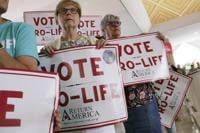RALEIGH, N.C. (AP) — A federal judge on Saturday blocked two portions of North Carolina's new abortion law from taking effect while a lawsuit continues. But nearly all of the restrictions approved by the legislature this year, including a near-ban after 12 weeks of pregnancy, aren't being specifically challenged and remain intact.
U.S. District Judge Catherine Eagles issued an halting enforcement of a provision to require surgical abortions that occur after 12 weeks — those for cases of rape and incest, for example — be performed only in hospitals, not abortion clinics. That limitation would have otherwise taken effect on Sunday.
And in the same preliminary injunction, Eagles extended beyond her an order preventing enforcement of a rule that doctors must document the existence of a pregnancy within the uterus before prescribing a medication abortion.
Short of successful appeals by Republican legislative leaders defending the laws, the order will remain in effect until a lawsuit filed by Planned Parenthood South Atlantic and a physician who performs abortions challenging the sections are resolved. The lawsuit also seeks to have clarified whether medications can be used during the second trimester to induce labor of a fetus that can’t survive outside the uterus.
The litigation doesn’t directly seek to topple the crux of the abortion law enacted in May after GOP legislators North Carolina had a ban on most abortions after 20 weeks before July 1, when the law scaled it back to 12 weeks.
The law, a response to the 2022 U.S. Supreme Court ruling that , also added new exceptions for abortions through 20 weeks for cases of rape and incest and through 24 weeks for “life-limiting” fetal anomalies. A medical emergency exception also stayed in place.
On medication abortions, which bill sponsors say also are permitted through 12 weeks of pregnancy, the new law says a physician prescribing an abortion-inducing drug must first “document in the woman’s medical chart the ... intrauterine location of the pregnancy.”
Eagles wrote the plaintiffs were likely to be successful on their claim that the law is so vague as to subject abortion providers to claims that they broke the law if they can't locate an embryo through an ultrasound because the pregnancy is so new.
“Providers cannot know if medical abortion is authorized at any point through the twelfth week, as the statute explicitly says, or if the procedure is implicitly banned early in pregnancy,” said Eagles, who was nominated to the bench by then-President Barack Obama.
And Eagles wrote the plaintiffs offered “uncontradicted" evidence that procedures for surgical abortions — also known as procedural abortions — after 12 weeks of pregnancy are the same as those used for managing miscarriages at that time period. Yet women with miscarriages aren't required to receive those procedures in the hospital, she added.
Republican legislative leaders defending the law in court “have offered no explanation or evidence — that is, no rational basis — for this differing treatment,” Eagles said in her order.
Abortion-rights advocates still opposed to the new 12-week restrictions praised Saturday's ruling.
“We applaud the court’s decision to block a few of the onerous barriers to essential reproductive health care that have no basis in medicine," said Dr. Beverly Gray, an OB-GYN and a named plaintiff in the case.
A spokesperson for Senate leader Phil Berger, one of the legislative defendants, said Saturday that Eagles’ order was still being reviewed.
Lawyers for Republican legislative leaders said in court documents in September that the provision requiring the documentation of an intrauterine pregnancy was designed to ensure the pregnancy was not ectopic, which can be dangerous. And “North Carolina rationally sought to help ensure the safety of women who may require hospitalization for complications from surgical abortions,” a legal brief from the lawmakers read.
State Attorney General Josh Stein, a Democrat, abortion-rights supporter and , is officially a lawsuit defendant. But lawyers from his office asked Eagles to block the two provisions, largely agreeing with Planned Parenthood's arguments. Stein said Saturday he was encouraged by Eagles' ruling.










































